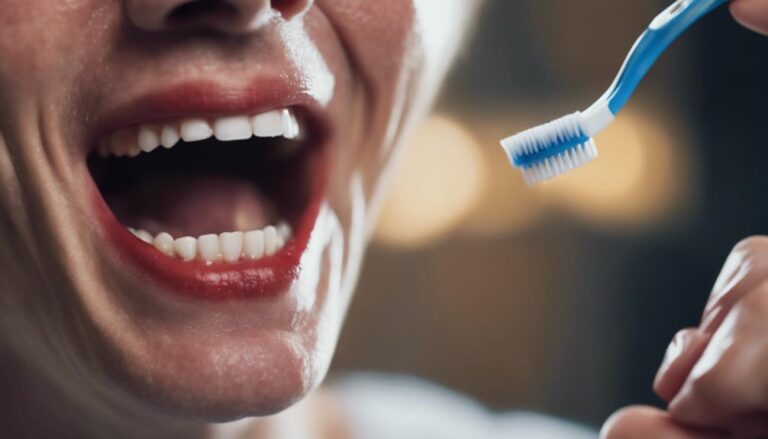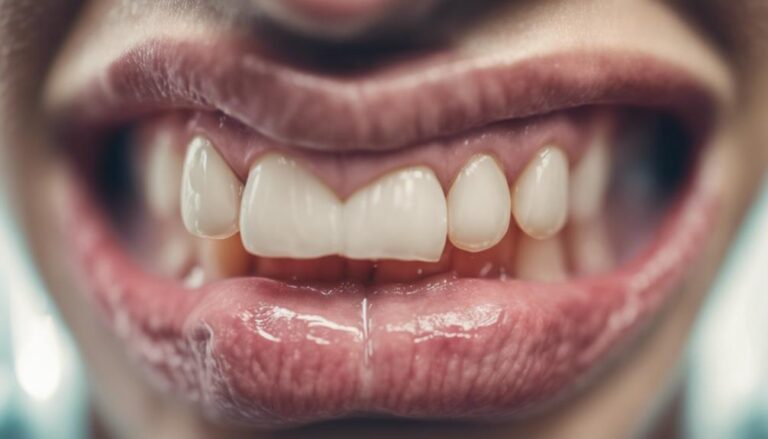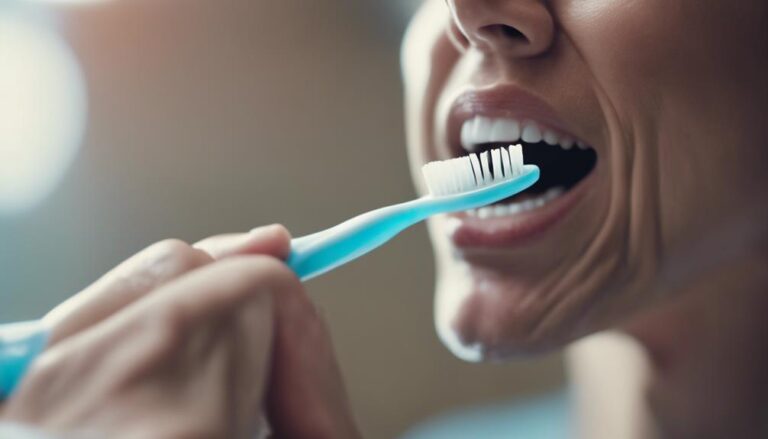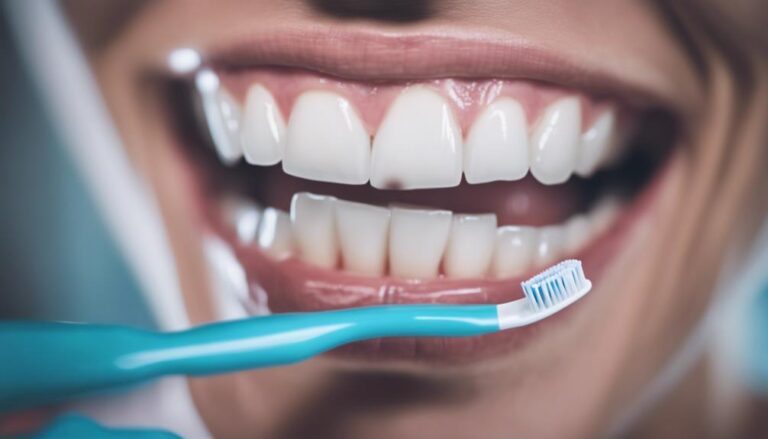Linking gum disease with bad breath highlights the crucial connection between oral health and halitosis. Poor oral hygiene, plaque buildup, and bacterial growth are key culprits behind these issues. Factors like inflammation of gums, periodontal disease, and decreased saliva production further exacerbate bad breath. Additionally, lifestyle habits, medication side effects, and certain triggers play significant roles. Understanding these causes underscores the importance of maintaining good oral hygiene practices. By addressing these factors, one can effectively combat gum disease and bad breath. More insights into prevention and management strategies can enhance oral health wellness.
Key Takeaways
- Plaque buildup from poor oral hygiene is a major cause of gum disease and bad breath.
- Bacterial growth in the mouth disrupts the oral microbiome, leading to gum issues and foul breath.
- Inflammation of gums caused by bacterial toxins and plaque contributes to gum disease and bad breath.
- Gum infections result from harmful bacteria residing below the gum line, impacting both oral health aspects.
- Tartar accumulation near the gum line accelerates gum disease progression and exacerbates bad breath.
Poor Oral Hygiene
Poor oral hygiene greatly contributes to the development of gum disease and subsequent bad breath. Effective brushing techniques are essential in preventing plaque buildup, which is a primary cause of gum disease. It’s vital to brush at least twice a day using fluoride toothpaste and a soft-bristled toothbrush. Brushing should be done gently in a circular motion to remove plaque and debris thoroughly.
In addition to proper brushing techniques, using mouthwash can provide added benefits in maintaining oral health. Mouthwash can reach areas in the mouth that may be difficult to access with a toothbrush, helping to reduce bacteria and freshen breath. Look for mouthwashes that contain antibacterial properties to further combat gum disease-causing bacteria. However, mouthwash shouldn’t replace brushing and flossing but should be used as a supplementary step in oral hygiene routines.
Plaque Build-Up
Effective oral care routines play an essential role in preventing the accumulation of plaque, a significant factor in the development of gum disease. Plaque is a sticky, colorless film of bacteria that constantly forms on our teeth. If not removed through proper oral health maintenance practices like brushing and flossing, plaque can harden into tartar, leading to gum inflammation and potential gum disease. Regular dental check-ups and professional cleanings are vital in removing stubborn tartar buildup that can’t be eliminated through regular brushing alone.
Gum disease prevention starts with controlling plaque formation. This entails not only brushing teeth at least twice a day but also ensuring proper technique to reach all tooth surfaces effectively. Flossing daily helps remove plaque from areas between teeth where brushes can’t reach. Additionally, using antimicrobial mouth rinses can aid in reducing plaque and gingivitis-causing bacteria. Overall, consistent oral hygiene practices are key in combating plaque build-up and maintaining healthy gums.
Bacterial Growth
How does bacterial growth contribute to the development of gum disease?
Bacterial growth plays a vital role in the progression of gum disease by disrupting the delicate balance of the oral microbiome and affecting gum health. The oral microbiome consists of various bacteria that naturally reside in the mouth, some of which are beneficial, while others can be harmful. When there’s an overgrowth of harmful bacteria due to poor oral hygiene practices, these bacteria can form plaque, a sticky film that adheres to the teeth.
As plaque accumulates, the bacteria release toxins that irritate the gums, leading to inflammation and potential infection. This inflammatory response is a key factor in the development of gum disease. Additionally, certain bacteria within the plaque produce acids that can erode the enamel of the teeth and further contribute to the progression of dental issues.
Maintaining a healthy balance in the oral microbiome through proper oral hygiene practices is essential for preventing bacterial overgrowth and preserving gum health. Regular brushing, flossing, and dental check-ups can help control bacterial growth and reduce the risk of gum disease.
Inflammation of Gums
Inflammation of the gums, caused by bacterial toxins and plaque buildup, is a common early sign of gum disease. When left untreated, this inflammation can progress to more severe stages of periodontal disease. To address this issue effectively, prevention strategies and appropriate treatment options are essential.
- Regular Dental Hygiene: Brushing teeth twice a day and flossing daily can help remove plaque and prevent bacterial buildup.
- Professional Dental Cleanings: Regular visits to the dentist for professional cleanings can help remove hardened plaque (tartar) that can’t be removed by regular brushing.
- Antimicrobial Mouthwash: Using an antimicrobial mouthwash can help reduce bacteria in the mouth, thereby decreasing inflammation.
- Healthy Diet: Consuming a diet rich in vitamins and minerals can support gum health and overall oral hygiene.
- Consulting a Dentist: Seeking professional advice from a dentist is essential for early detection, personalized prevention strategies, and appropriate treatment options tailored to individual needs.
Periodontal Disease Progression
The progression of gum disease from early inflammation to advanced periodontal stages can have significant implications for oral health and overall well-being. As gum disease advances, one common consequence is gum recession, where the gum tissue pulls back, exposing more of the tooth and potentially leading to tooth sensitivity.
To help combat the progression of gum disease, incorporating mouthwash into your oral hygiene routine can bring added benefits. Mouthwash can reach areas that a toothbrush may miss, helping to reduce plaque and bacteria that contribute to gum disease.
If left untreated, advanced periodontal disease can ultimately result in tooth loss. Therefore, early detection and appropriate gum disease treatment are vital. Seeking professional dental care for regular cleanings and check-ups is essential in maintaining gum health and preventing the progression of periodontal disease. Dentists can provide tailored advice on treatments such as scaling and root planing to address gum disease effectively.
Gum Infections
Gum infections can develop when harmful bacteria accumulate below the gum line, leading to inflammation and potential damage to the surrounding tissues. This condition, also known as gingivitis, is a common early stage of gum disease that can progress if left untreated.
To prevent gum infections and maintain excellent oral health, consider the following:
- Regular Brushing and Flossing: Proper oral hygiene is essential in preventing the buildup of bacteria and plaque.
- Routine Dental Check-ups: Regular visits to the dentist can help detect early signs of gum disease and prevent its progression.
- Healthy Diet: A balanced diet rich in nutrients can support overall oral health and boost the immune system.
- Avoid Tobacco Products: Smoking and tobacco use can increase the risk of gum infections and hinder healing.
- Professional Cleanings: Professional cleanings by a dental hygienist can remove hardened plaque and tartar, reducing the risk of gum disease.
Pockets Forming in Gums
Often, as gum disease progresses, small pockets begin to form in the gums, creating spaces where bacteria can thrive and cause further damage if left untreated. These pockets, resulting from gum recession, are a common sign of advanced gum disease. If you notice your gums pulling away from your teeth or experience increased sensitivity, it may be time to seek professional help to prevent further deterioration.
Early detection of these pockets is vital in preventing irreversible damage. Your dentist can offer various treatment options, such as deep cleaning procedures like scaling and root planing to remove bacteria and tartar from below the gumline. In severe cases, surgical interventions may be necessary to reduce pocket size and restore gum health.
To prevent pockets from forming in your gums, practicing good oral hygiene is key. Regular brushing, flossing, and dental check-ups can help catch gum disease in its early stages. Being proactive about your gum health and addressing any signs of gum disease promptly can help maintain a healthy smile and prevent complications in the future.
Food Particles Deposited
Among the contributing factors to gum disease is the accumulation of food particles deposited in the spaces between teeth and along the gumline. As someone who aims for excellent oral health, understanding the impact of food particles is important. Here are some key points to keep in mind:
- Dietary choices impact: Consuming sugary and sticky foods increases the likelihood of food particles getting stuck in the teeth and gums.
- Oral care regimen: Regular brushing and flossing play an essential role in removing food particles and preventing gum disease.
- Food particle breakdown: Bacteria in the mouth break down trapped food particles, leading to the formation of plaque.
- Plaque formation: The accumulation of plaque can irritate the gums, leading to inflammation and eventually gum disease.
- Preventive measures: Maintaining a healthy diet and a thorough oral care routine can help minimize the deposition of food particles and reduce the risk of gum disease.
Tartar Accumulation
The presence of tartar on teeth can greatly impact oral health and contribute to the progression of gum disease. Tartar, also known as dental calculus, forms when plaque – a sticky film of bacteria – hardens on the teeth. Tartar accumulation near the gum line can lead to irritation and inflammation, promoting the development of gum disease. To prevent tartar buildup, it’s important to maintain good oral hygiene practices such as regular brushing with a fluoride toothpaste, flossing daily, and scheduling routine dental cleanings.
Gum disease awareness is essential in understanding the significance of tartar accumulation. Early signs of gum disease include red, swollen, or bleeding gums, which can progress to more severe forms if left untreated. Regular dental check-ups can help detect gum disease in its early stages and prevent further complications.
Incorporating effective tartar prevention techniques into your oral care routine is crucial for maintaining healthy teeth and gums. By staying proactive in your oral hygiene habits and seeking professional dental care, you can reduce the risk of tartar buildup and minimize the potential impact on gum disease.
Tooth Decay Impact
Tooth decay, a common dental issue, can have significant consequences on oral health if left untreated. When tooth decay occurs, it can lead to various oral health problems that contribute to bad breath and gum disease.
Here are some key points to take into account regarding the impact of tooth decay:
- Diet Choices: Consuming sugary and acidic foods can increase the likelihood of tooth decay, as these substances can erode enamel and create an environment conducive to bacterial growth.
- Genetics Influence: Some individuals may have a genetic predisposition to weaker enamel or a higher susceptibility to cavities, making them more prone to tooth decay.
- Regular Dental Check-ups: Routine dental visits are important for early detection and treatment of tooth decay to prevent further complications.
- Proper Oral Hygiene: Brushing and flossing daily can help remove plaque and food particles that contribute to tooth decay.
- Fluoride Use: Incorporating fluoride toothpaste and mouthwash into your oral care routine can help strengthen enamel and prevent decay.
Bleeding Gums
When experiencing bleeding gums, it’s important to understand the potential underlying causes and implications for oral health. Bleeding gums are often a sign of gum disease, where plaque buildup irritates the gums, leading to inflammation and bleeding. Proper dental care, including regular brushing, flossing, and dental check-ups, is essential to prevent and address this issue. Neglecting bleeding gums can escalate the problem, potentially resulting in advanced gum disease and tooth loss.
Treatment options for bleeding gums depend on the underlying cause. A dentist may recommend professional cleanings to remove hardened plaque, known as tartar, from the teeth and gums. In more severe cases, deep cleaning procedures like scaling and root planing may be necessary to treat gum disease. Additionally, antimicrobial mouth rinses or antibiotics could be prescribed to combat infection and reduce inflammation.
Prevention methods for bleeding gums include maintaining good oral hygiene practices, such as brushing twice a day with fluoride toothpaste, flossing daily, and using an antiseptic mouthwash. A balanced diet low in sugary foods and regular dental visits can also help prevent gum disease and its associated symptoms. Proper care and attention to bleeding gums are essential for overall oral health and well-being.
Halitosis Triggers
Regularly practicing good oral hygiene habits is essential in identifying and addressing potential halitosis triggers. When it comes to managing bad breath, understanding the factors that can contribute to halitosis is important.
Here are some key triggers to keep in mind:
- Dietary choices: Certain foods like garlic, onions, and spicy dishes can leave a lingering odor in the mouth, leading to bad breath.
- Hydration levels: Dehydration can result in decreased saliva production, which is essential for maintaining oral health and keeping bad breath at bay.
- Poor oral hygiene: Neglecting proper brushing, flossing, and tongue cleaning can allow bacteria to accumulate in the mouth, causing unpleasant odors.
- Smoking and tobacco use: Tobacco products not only contribute to gum disease but also leave a distinct smell that can persist in the mouth.
- Underlying medical conditions: Issues like dry mouth, sinus infections, and gastrointestinal problems can all play a role in halitosis and may require professional intervention to address effectively.
Saliva Production Decrease
A decrease in saliva production can greatly contribute to the development of bad breath by allowing bacteria to thrive in the mouth. Saliva plays an essential role in maintaining oral health by washing away food particles and bacteria that can lead to unpleasant odors. When saliva production decreases, such as in conditions like dry mouth (xerostomia), bacteria can proliferate, causing bad breath.
To combat the effects of reduced saliva production, saliva stimulation techniques can be beneficial. Chewing sugar-free gum or sucking on sugar-free candies can help increase saliva flow, aiding in the removal of bacteria and food debris that contribute to bad breath. Additionally, staying hydrated by drinking plenty of water throughout the day can also help maintain adequate saliva production.
Using mouthwash can further complement saliva stimulation efforts. Mouthwashes containing antibacterial agents can help reduce the number of bacteria in the mouth, reducing the likelihood of bad breath. Incorporating these strategies into your daily oral hygiene routine can help mitigate the effects of decreased saliva production and promote fresher breath.
Medication Side Effects
Have certain medications been linked to causing dry mouth and contributing to the development of bad breath?
Yes, certain medications can have side effects that impact saliva production, leading to dry mouth and subsequently bad breath. This is a vital issue that many individuals face when taking medication for various health conditions.
Here are some key points to bear in mind regarding medication side effects and their impact on oral health:
- Some medications can reduce saliva production, leading to dry mouth.
- Dry mouth can create an environment where bacteria thrive, causing bad breath.
- Certain drugs may alter taste perception, affecting dietary choices.
- Hydration levels can be affected by medications, impacting saliva production.
- It’s important to stay hydrated and maintain good oral hygiene when on medication to mitigate these effects.
Understanding how medications can affect oral health is essential in managing bad breath and promoting overall well-being. Being aware of these potential side effects can help individuals take proactive steps to maintain oral health despite medication use.
Lifestyle Habits
Maintaining healthy lifestyle habits is essential for promoting good oral health and preventing issues like bad breath. When it comes to diet choices, consuming sugary and acidic foods can contribute to plaque buildup and increase the risk of gum disease. Opting for a balanced diet rich in fruits, vegetables, lean proteins, and whole grains can help support a healthy mouth.
Stress management is another vital aspect of maintaining good oral health. Chronic stress can weaken the immune system, making it harder for the body to fight off oral infections. This can lead to gum disease and, subsequently, bad breath. Implementing stress-reducing techniques such as exercise, mindfulness, or hobbies can positively impact both your mental well-being and your oral health.
Frequently Asked Questions
Can Genetics Play a Role in the Development of Gum Disease and Bad Breath?
Genetic predisposition can influence gum disease and bad breath, but environmental factors also play a significant role. Understanding how genes and surroundings interact helps in managing oral health effectively. It is important to take into account both components for the best care.
How Does Stress Impact the Severity of Gum Disease and Bad Breath?
When it comes to the impact of stress on gum disease and bad breath, stress management is essential. High stress levels can weaken the immune system, making it harder to fight off infections, including those in the mouth. Consistent oral hygiene practices are important.
Are There Any Specific Foods That Can Worsen Gum Disease and Bad Breath?
Certain dietary habits, like consuming sugary snacks and acidic beverages, can worsen gum disease and bad breath. To prevent these issues, maintaining good oral hygiene habits and incorporating solutions like regular dental check-ups are essential.
Can Hormonal Changes in Women Affect the Likelihood of Gum Disease and Bad Breath?
Hormonal fluctuations in women can impact oral health. These changes can increase the likelihood of periodontal disease, leading to bad breath. Understanding this connection is essential in maintaining women’s health and managing oral hygiene effectively.
Is There a Link Between Untreated Allergies and the Progression of Gum Disease and Bad Breath?
Untreated allergies can exacerbate gum disease and bad breath. Effective allergy treatment is essential. Maintaining excellent oral hygiene is also vital to prevent these issues from progressing. Consistent care can help manage symptoms.
Conclusion
To sum up, the link between gum disease and bad breath is like a tangled web that can’t be ignored. Just as neglecting a garden leads to overgrowth and decay, neglecting oral health can result in plaque build-up, bacterial growth, and inflammation that contribute to halitosis.
By maintaining good oral hygiene practices, addressing any underlying issues, and making positive lifestyle changes, we can keep our mouths fresh and healthy like a well-tended garden.






